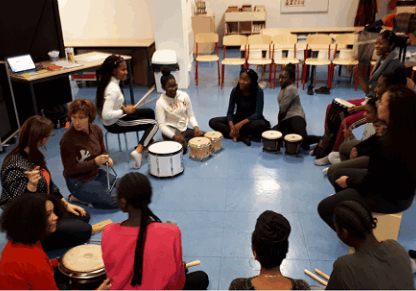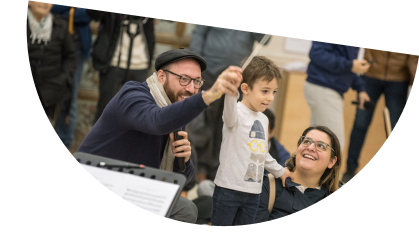“An Opera is more than ever a centre of resource, a landmark of shared culture and citizenship.”
With the European project EducOpera, the Opéra de Massy aims, with its French, Danish, Spanish, Italian and Slovenian partners, to combat early school-leaving through opera education. We asked some questions to Marjorie Piquette, Head of Education at the Opéra de Massy, and Bénédicte Halba, founding president of iriv and Director of iriv conseil.
Could you sum up the project in a few words?
EducOpera is a lifelong learning study project supported by Erasmus +. It is led by the Opéra de Massy and the French partner Iriv Conseil alongside five European countries: France, Denmark , Spain, Italy, and Slovenia.
It aims to offer innovative methods to educators inside and outside the school environment and to combat early school-leaving through opera education.
What are your main objectives?
The project is spread over two years (2017-2019). The objectives of this first year are to implement a tool and methodology enabling the identification and evaluation of skills acquired by teenagers aged 13 to 15 through opera education and offer various educational sessions. During the second year, a tutorial will be developed allowing educators to make the best use of this approach. Finally, a guide will sum up the educational approaches by integrating feedback from the five partner countries where the the tool and tutoring was tested.
How did your objectives evolve over this first phase and how do you envision phase 2?
The first year involved introductory opera (singing, dance and acting) workshops involving willing young people, which enabled us to work on the tool and the EducOpera methodology, which will then be formalised by the French partner Iriv Conseil. Each European country is free to apply the method that is most appropriate to their needs.
Next year, the tutoring for educators and teaching professionals will be tested in all five countries.
Ultimately, a user guide will be published in English and will address key players in Europe involved in the field of lifelong learning, with a focus on combating school leaving.
Which target groups do you work with as part of the project?
We work with willing pupils (aged 13-15) enrolled in the Collège Blaise Pascal in Massy, a “Priority Education” district. The Collège is a few hundred meters from the Opera and the education staff is also involved in the project.
Within this target group, the school pupils are the same age throughout the five partner countries. Partners work either directly with schools or through music schools or arts charities.
The professional target group is made up of teachers from secondary schools (pupils aged 13 to 15), conservatoires, non-profit organisations and communities offering learning and academic support programmes.
Who are your partners?
We have five European partners: iriv conseil in Paris; University of Perugia in Italy, a training organization in Spain, University of Aarhus in Denmark, and Research Institute ZRC SAZU in Slovenia. All are working simultaneously on the same objectives with their beneficiaries as schools or non-profits.
More information about our partners can be found at: http://www.educopera.eu/
How would you describe your work with the project partners?
We work with our partners in a very collaborative fashion. Our first meeting enabled us to get to know each other in the flesh. A first iteration of the tool, created by iriv conseil, enabled us to collect some initial information about various national programmes aimed at preventing academic failure as well as the state of music education in each country.
A more refined version, available from the first week of May, will take into account the field experience of the first experimentation – France is very much ahead with a series of seven sessions already carried out. In June we will discuss the project progress at a meeting in Denmark.
What tools do you use to evaluate the success (or not) of the activities?
An external Slovenian evaluator will assess whether the relevant target groups – pupils and educators – were engaged with. Partner feedback, including data and requested information, will be collected and compared from a quality point of view. Additional tests will be requested from the partners if needed.
Opéra de Massy has been a member of RESEO for 15 years. How has belonging to a European network impacted your education activities?
The Opéra de Massy is the youngest Opera in France, with the particularity of being located in a town on the outskirts of Paris and in a “priority” neighborhood. It has been since its very beginnings a laboratory of cultural policies and it seemed natural to us to share our activities with our colleagues.
The impact of RESEO is very beneficial because it enables reciprocal exchange of experience and knowledge. Thanks to RESEO, our Spanish partner was able to contact the Madrid Opera. The other partners mobilized their own networks.
Opera is “the most European of art forms”. In your opinion, what does a European dimension contribute to education programmes, in comparison with local or national projects?
An Opera is more than ever a centre of resource, a landmark of shared culture and citizenship. Opera breaks down cultural barriers and encourages daring in creation, mixing of styles and arts. In this, Opera is European and more generally universal.
Opera was born in Europe and its languages are Italian, German, French and English: all European languages.
At its Autumn Conference 2017 RESEO took a look at the idea of “creative cooperation”: i.e the cooperation of arts organisations with schools, communities, cities and individuals as well as with each other. What do you think makes the success of a collective project?
Creative cooperation could sum up the day-to-day work of the Opéra de Massy, as we are connected to all the cultural and social facilities of the town. When opera enables two worlds to come into contact that did not previously do so, that’s a victory for us.
« Thanks to opera, I discovered a passion for an instrument, a profession that I didn’t think was for people like me… But also thanks to opera, I get on better with the rest of my class and I’ve learnt to express myself better…”
EducOpera aims, based on the extraordinary and successful experience of the Opéra de Massy, to compare the approaches in neighboring countries that are sensitive to the arts – Italy, Spain, Denmark (a very modern Opera was built in Copenhagen), and in Slovenia (where the arts scene is very avant-garde).
EducOpera is based on the principle that music education promotes the cognitive, emotional, physical and social development of young people, an idea that RESEO is currently addressing in its work on social-emotional learning. What do you think are the specific benefits of opera education?
Opera education addresses multiple skills, including:
Artistic skills: singing, music, dance, staging, sets and costumes
Technical skills: staging, sets, sounds and lighting
Management skills: financing of productions, sponsorship, public subsidies, ticketing, co-productions …
Opera education as offered by the EducOpera project is close to the opera professions presented during “Schola”, a previous European project in which the Opéra de Massy had partnered, in which pupils from Blaise Pascal attended monthly introductory sessions to volunteering throughout the year.
Authors: Marjorie Piquette, Head of Education at the Opéra de Massy, and Bénédicte Halba, founding president of iriv and Director of iriv conseil.


